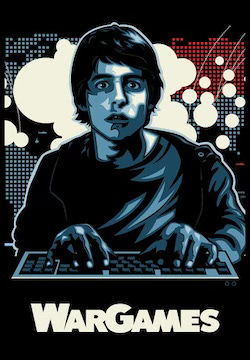One of my daughters recently asked, “Dad, what was it like growing up in the 80’s.” Wow. How much time do you have? That is a question for the ages. The heart of my response centered around Ronald Reagan and the late Cold War era, as well as growing up in constant terror of nuclear annihilation.
My younger daughter also loves movies, so I suggested that, in the spirit of her question, we have our own Cold War film festival. The festival officially began last night when we watched War Games. (While we were driving the other day, I played her Sting’s song “Russians” as a preview for the pop-culture artifacts to come.)
I saw War Games in the theater in 1983, and that film was not only a smash, but it gradually rooted itself in our cultural identity, especially regarding human beings turning over decision making to technology. War Games has become more relevant with each passing year (the past teaches us about the future), and it’s a rich cultural document in terms of re-rereading/re-watching culture. To watch War Games today is a fresh experience, vastly different from even two to three years ago, let alone 40 years.
First, let me say the obvious. Many films simply don’t hold up, and the 80’s is no exception (see: Sixteen Candles), but War Games not only holds up, it’s truly great. If anyone wants a fun, under-2-hour romp, this film delivers. It’s both entertaining and fascinating. Plus, you get to see a young, pre-Ferris Bueller’s Day Off Matthew Broderick, as well as a pre-Breakfast Club Ally Sheedy, and they are both super charming. Plus, any film with Dabney Coleman is automatic gold.
While rewatching War Games, each passing scene made clear to me that it never meant what we thought. The easy, long-running reading of War Games hews to a common theme: we mustn’t turn human decision making over to machines because disaster will ensue and the machines will likely kill us. For evidence of this, look no further than The Terminator, released the very next year (1984) and, well, the title says it all.
Currently, we hear many similar arguments regarding artificial intelligence (AI), and I think we can safely say that much of our thinking is out over its skis in relation to our actual understanding—as is often the case with tech, we are furiously trying to catch up. That being said, we can certainly point to “bad AI” that, incorporated far too early, has led, for example, to controversial implementation and (un)decisions in the current Gaza conflict. No day goes by where AI is not a topic, in some form, in my newsfeed (while also likely curating it), and there’s a cultural tug-of-war over a wide range of issues: copyright violation, policing, education, the replacement of human workers, etc.
Labor is the issue with which War Games begins. Human beings, who did not launch nuclear missiles (or “turn they key”) during a drill which they did not know was a drill, are replaced by a computer with the king of acronyms: WOPR (“War Operation Response Plan,” pronounced “Whopper”). The rest of the film, which I can spoil since it is 40+ years old, centers around WOPR, who goes by “Joshua” (long story), having entered a game of “Global Thermonuclear War” with Matthew Broderick’s character, who has hacked into what he thought was a game company. The computer plays “Global Thermonuclear War” for real, and thus the tension builds around whether it will eventually seize control of the launch codes and bomb the Soviets, who will of course bomb us in return. Game over.
Again, the basic plot has produced a consistent and durable reading: artificial intelligence (The WOPR) is bad because it might seize control of power and resources that should remain under human control. But there’s a problem with this reading, and one that might not have been so obvious to us until now: the problem is not that Joshua is an out-of-control AI; the problem is that Joshua is not yet fully AI enough. No human character saves the world in War Games: machine learning does! As a large-language or data model, Joshua has not yet “learned” that games with no possible winning outcome are not worth playing. Once Joshua learns this and becomes a better AI, the world is saved.
Here’s War Games in list form:
The only thing that prevents a real nuclear war in War Games is a machine that learns.
Furthermore, the machine has learned/taught itself something, via its large capacity to process data and run simulations, that human beings have yet to learn during our entire existence.
Put another way, AI is not the problem in War Games; it is the solution. How do we know this? Joshua was first brought in because all the humans involved wouldn’t kill millions of people during the opening drill; nearly 30% of the military personnel who “failed” the drill did so because they would not engage in what the AI, Joshua, eventually learns to be a completely futile and wrong decision. I would argue that the two strongest messages offered to 2024 viewers of War Games are, first, that we actually need more and better AI and, second, that the need for cybersecurity experts is dire and pressing (someone hacking into the WOPR is what started this all in the first place: “Want to play a game?”). I’m not saying these are necessarily my views, but I’d argue this is the message the film offers.
I’d be remiss if I didn’t say that this is the power of science fiction—the best sci-fi is always ahead of its time; it often predicts, and even conjures, new technologies into being, and most importantly, it gets us thinking about problems that don’t exist yet but likely will. I will say what I always say in this space: artists are visionaries and their visions maintain a protean relevance well beyond the initial act of creation.
Of course it’s possible that the script writers intended to send the message I am pointing to as “wrong.” It’s Hollywood, there’s collaboration on the script, constant rewrites, and the unlikelihood that a perfectly cohesive story is even a goal. Maybe they just want a thriller, a computer that is a friendlier Hal 9000, and a vehicle for two rising teenaged stars. But the text is still the text, and this text has an AI saving the world rather than destroying it.
War Games in 2024 is not the War Games of 1983, 1993, or 2003. Viewing this film now—and it’s still a great movie—is a worthwhile example of how we can look to voices from the past, whose sound still carries, and involve those voices in fresh interpretations of contemporary and future issues.
Maybe War Games was more of a game than we thought. This narrative that, for so long, we’ve accepted as arguing for serious checks on technology might have been saying the opposite: we need a different kind of intelligence because only that can save us from ourselves.
If you have any ideas for films to add to our Cold War Film Festival, drop them in the comments!
Thanks for listening and give War Games a try.





Two easy picks: Dr. Strangelove and The Day After.